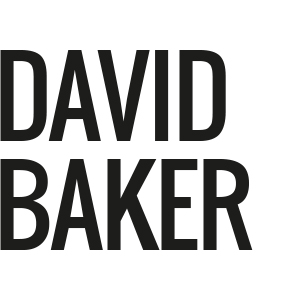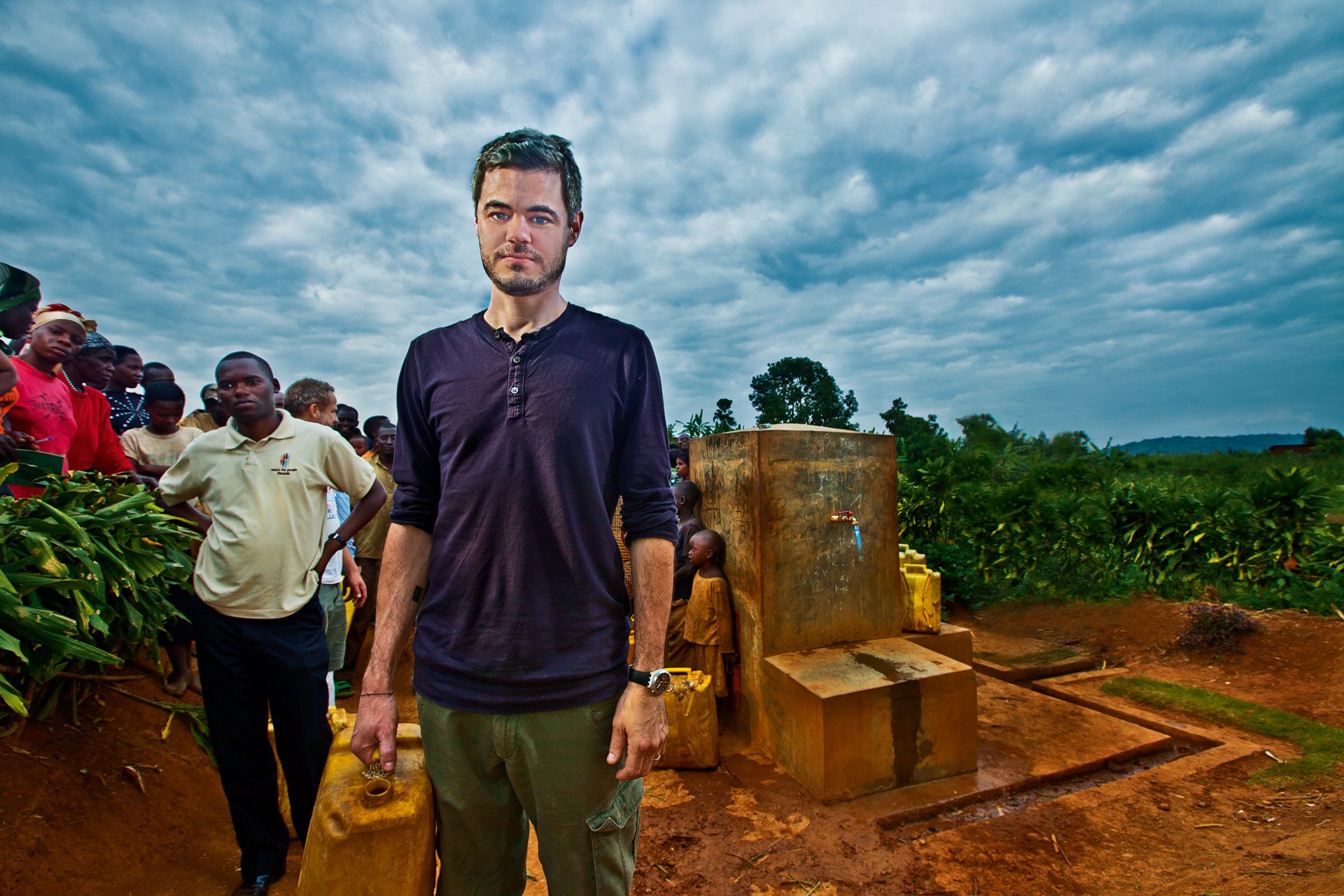Can Silicon Valley solve Africa’s water problem? Scott Harrison is on a mission to try
Wired, January 2013
Scott Harrison, the founder and president of charity:water, has stolen away from an official reception for a new water project his organisation has funded in Kisaro in northern Rwanda. As happens almost everywhere he goes in the country, he is surrounded by children. From somewhere, he has found a football made of foam rubber held together with string and has improvised a game of catch that has the kids running through the cassava fields shrieking with laughter. These children and their future, he tells Wired, are the reason charity:water exists. As he turns to go, he raises his hand and comes as close to blessing them as any nightclub-promoter-turned-philanthropy-evangelist can. “May you enjoy clean water for the rest of your lives and grow and flourish and live in a world that is a better place,” he says. Then he returns across the fields to the speeches and celebratory lunch.
Compared with many charities in the sector, charity:water is young, but it is not small. It has raised more than $65 million (£42 million), funded more than 6,600 clean-water projects, mostly in sub-Saharan Africa, and recruited more than 300,000 donors. Thanks to its work, villagers in remote rural locations, who previously had been drinking water from bug-infested swamps or spending most of their days walking kilometres to fill jerry cans from a distant, expensive and often unreliable source, have had clean water on tap. And that has not only improved their health and sanitation but has also given them the time and money to build businesses, grow more crops and feed their children.
There are many successful water charities working in the developing world. But it is the way that charity:water has gone about fundraising that makes it notable — and that has attracted active and enthusiastic support from the tech world’s leading founders, from Spotify’s Daniel Ek to Square’s Jack Dorsey. The organisation uses social networks and digital tools, such as real-time video and GPS mapping, to provide its donors with a level of transparency that many other charities shy away from. It links donations to actual projects (rather than dropping them into a general pool) and keeps donors updated with how its work in the field is going — even when things have gone wrong. It uses the data-generating capabilities of the web to test campaigns and explore new ways of connecting donors to projects. It has displayed an instinct for design and branding that would be the envy of many a tech startup and which has left many other charities looking out of touch. And it has reached a demographic — young, hip and sceptical — that often has very little time for charitable giving.
Harrison and his team are in Rwanda to shoot footage for some promotional videos to be shown on the charity:water website. For the first time in its history, he isn’t in charge of things: his wife Viktoria is directing the two-man camera crew and Harrison is giving the impression of being only half able to keep out of everyone’s way. Which is why it’s handy for Viktoria and for the cameramen when he discovers a group of kids to throw a ball around with.
Harrison is about as far from the typical image of a charity founder as you can get. Now 37, he grew up in New Jersey, the son of a businessman father and a mother who, from the time he was four, was suffering almost constantly from a number of debilitating illnesses. The household had a strongly Christian ethos, but he saw, he says, “a lot of hypocrisy”. In 1993, at the age of 18, he left to study design and communication at New York University. By his own admission Harrison wasn’t a model student, but he did discover a talent for putting on parties. By 1994, he was a working as a promoter on New York’s club scene. “I spent almost ten years getting drunk and getting other people drunk, partying way too much and chasing models,” he says. By the end of that time, he had more than 15,000 names in his contact book.
It was on holiday in Uruguay in 2004 that the hedonistic life began to lose its appeal. “I was with all the right people at a rented house with servants and horses in Punta del Este,” he says, as we bump along a dirt track to visit another charity:water-funded project north of Kigali. “We were partying like crazy; I remember we spent $1,000 (£617) on fireworks we lit in the back yard on New Year’s Eve. I think my dad had sent me a book by AW Tozer called The Pursuit of God and, hungover one day, I started reading it. The book was about a man chasing after the heart of God — wanting to know him more and live righteously. My life couldn’t have been in a starker contrast to that, and I began to see the mess I’d made with my life. I was emotionally, spiritually and morally bankrupt. At that house, a faith that I’d put in a remote corner of my life for a decade started to reawaken. I came back to New York determined to make a change and find a way to serve God with authenticity and integrity.”
Harrison gave up club promoting and volunteered to work as a photographer for the charity Mercy Ships, which operates a fleet of hospital boats providing medical care to the developing world. Volunteers paid about $500 (£309) a month to cover their living expenses and by this stage Harrison was almost penniless. “Nightclub promoters are terrible at saving money, but great at spending it,” he says. “During the few months before I joined the ship, I had blown through everything I had. I sold about 300 DVDs and some camera gear on eBay and asked some friends to help support me over the next couple of years.”
He sailed aboard the SS Anastasis, first to Benin, west Africa, and then to Liberia. “It was a huge change for me — it was very strange not to have my apartment and my car and the life in the clubs,” he says. “But when I saw those thousands and thousands of people coming up the gangplank, with illnesses and injuries you couldn’t believe, huge tumours on their faces, stuff like that, I knew I was lucky and I put it all behind me. Since that day I haven’t smoked a cigarette.” On this first tour, Harrison spent four months in Benin and four in Liberia, before flying back to New York in the summer of 2005 while the ship was in dry dock.
“I fell in love with Liberia and its people,” he says, “and it dawned on me what an opportunity it would be if my previous [clubbing] contacts could be corralled to make a difference to the people there. These were people living on less in a year than I would blow on a bottle of vodka,” he says. “It was shocking, powerful and an amazing opportunity to do good. So I started emailing people on my nightclub lists, showing them the people who came for treatment. People would reply saying things like, ‘I am sitting at my desk at Chanel and weeping.'”
It was also in Liberia that he made the connection between dirty water and poverty. “I saw people drinking from green swamps filled with bugs and algae and just couldn’t believe it,” he says. “I remember thinking, ‘No wonder things are growing on people’s faces.'”
On his return to New York, Harrison was sitting in a club when someone bought him a $16 (£10) margarita. “I had just returned from Africa,” he says, “and I thought, ‘How dare they?’ But then I relented and saw an opportunity: if my friends have $16 to spend on a drink, wait until they hear what they can do with that money in Africa.”
He worked another year for Mercy Ships before returning to New York. And there, on the night of 7 September 2006, his 31st birthday, Harrison threw a party in a so-hip-it’s-not-yet-opened nightclub in Manhattan’s Meatpacking District, charging $20 (£12) entry, with the promise that all the money raised would go to drilling wells in Africa. The night raised $15,000 (£9,260).
He returned to Africa, this time to the Bobi refugee camp in northern Uganda, where he funded the construction of three wells (and repairs to another three), bringing clean water to 30,000 people. He then did something that would shape all his subsequent fundraising.
“We sent everyone who had been at that party an email with photos of the wells, saying, ‘Look what your money has done,'” he says. “Half of them couldn’t even remember being at the party but they were blown away by the pictures and the difference they had made. It was incredible. I knew then we were on to something.” charity:water had been born.
People who meet Scott Harrison are struck by his passion, commitment and ability to tell his story, which goes a long way to explaining why he is such a darling of the tech world.
“Scott is awesome,” says Daniel Ek, Spotify founder and now long-term donor to charity:water. “He runs charity:water like a great startup. He understands virality and evangelism better than most folks in the industry. He’s disrupted the whole charity model.”
Jack Dorsey, CEO of Square, whom Harrison describes as one of his mentors, agrees: “Once you meet Scott, you understand in five minutes what he wants to do and why. It’s tangible and self-evident — he doesn’t have to say much at all.”
Harrison is naturally gregarious and a riveting storyteller, not because he uses fancy oratory but because, as he speaks, you can immediately picture what he is talking about.
By mid 2006 Harrison was touring Europe promoting Mercy Ships (he spoke in London to a packed Apple Store in Regent Street), but he was already forming what would become the core principles of charity:water. In one of the final posts on his Mercy Ships blog he talked about having launched a charity that would do three things: educate the public about the developing world; fund projects in the field; and, perhaps most significantly, maintain a connection with its donors. “Imagine logging on to a webpage every morning to see the foundation dug of your primary school in India, or the bricks stack higher on your health clinic in west Africa.”
He called the charity, charity: (the idea being that any global cause could go after the colon), bought the domain name charityis.org and, on his return to New York, spent “100 hours a week” with some friends “making it a reality”.
Even in those early days, charity:water was showing its skill for slick storytelling on the web. Most of the charityis domain now redirects to the charity:water website, but fragments of it can still be found online, and looking at them you are taken by their simple beauty: slideshows that scroll neatly through type and images; stories that are pared down to a calm, linear narrative. It may be too much to call them digital manifestations of Harrison’s character, but they are certainly testament to Dorsey’s description of his not having to say much to get his point across.
From the start, charity:water’s primary fund-raising tool was to persuade donors to give up their birthdays to raise money for wells in Africa — as Harrison had done in 2006 and would do again, this time in Uganda, in 2007. Donors create a fundraising page on the website, and urge friends, family and of course friends of friends and family, to donate a dollar per birthday year instead of presents. Everyone can see in real time how much money has been raised and, when the money is spent, the charity uploads images, video and the GPS co-ordinates of the well(s) they have helped build and the people they have helped. The idea has now extended to other fundraising activities, such as running a marathon, but birthdays are still the most popular way people raise money for charity:water. More than 120,000 people have signed up to the campaign, including Dorsey, who has given up his 33rd, 34th and 35th birthdays so far and has raised $175,000 (£108,044) for wells in Ethiopia. (All fundraising pages, and details of the supported projects, are open for anyone to view. Dorsey’s is at mycharitywater.org/p/profile/?member_id=10026.)
Liam Sharp Ek, who raised $45,000 (£27,782) on his 29th birthday and continues to support the charity through personal donations, says it was the transparency that impressed him most. “What is interesting is that, 18 months after donating to a project,” he says, “I am being given updates on where my donation was deployed and the effect it is having on the community. This is a huge change from traditional charity giving where, once you give, you forget. Once people feel part of something good, it actually changes the way they donate in the future.”
In its first 18 months, the charity raised $2.7 million (£1.7 million) for 481 water projects. Then, on February 9, 2008, Harrison wrote an email to the founder of every social network he could think of, asking for their help.
“I had the idea that I could get all the people who ran social networks to persuade their members who were born in September to join me and raise money for our latest project, which was to bring water to people in Ethiopia. And the one thing that social networks know about their members is their birthday.”
Harrison received just one reply, but it was one that would ensure charity:water’s long-term success.
“He was emailing all the social networks asking for free publicity,” says Michael Birch, founder of Bebo. “I got back to him, but the AOL deal was going through [AOL bought Bebo in 2008 for $850 million (£524 million)] so I said, ‘Let’s talk later.’ A few months later I went to New York to meet him in this cramped office and I was blown away, both by his story and by him as an individual. He has thrown away the rulebook when it comes to charities. It reminded me of a tech startup: it was disruptive and he was hiring smart people who worked hard. I wanted to help.”
From the start, Harrison had established two principles for charity:water that would be non-negotiable: 100 percent of the money people gave for water projects would go to water projects; and there would be 100 percent transparency so that donors could see where their money was going. To achieve the first goal, Harrison set up two bank accounts, one for water projects and the other for the charity’s running costs, with an inviolable wall between the two. The trouble was, the running-costs account was running dangerously low.
“By the time Michael wrote back, we had five weeks’ money left,” he says. “I didn’t know how to go to people for money. Then he and Xochi [Birch’s wife] gave us $1 million (£617,000).”
“I was an angel investor then, so I invested $1 million in the operations fund,” Birch says. “It was like any other angel investment except that I was guaranteed zero return. That was a relief really,” he laughs. “There was no pressure that way.”
The Birches now give $1 million a year towards charity:water’s annual operating costs of just under $5 million. About 100 others have joined them — mostly wealthy digital entrepreneurs who cover the charity’s back-office expenses and leave Harrison and his team to raise money for the water projects.
One of these background investors is Neil Hutchinson, founder and MD of Forward Internet, a London-based VC company. “What caught my eye,” he says, “was the model of transparency. One hundred percent of what people give goes to the field and you can see what is happening, with the GPS co-ordinates and so on. I look at donations to charity as an investment and treat them like other investments, and Scott has a very tech approach to charity, delivering data and numbers. You can see a clear return.”
Ek puts it more simply: “I’m very proud to call him my friend.”
Harrison’s exit from the club scene was also his return to Christianity, and he often talks of his life and mission in religious terms.
“I wanted to reinvent charity,” he says. “I thought it had become broken and stigmatised. The word means ‘love’, and I truly believe that giving time, talent, money is wholly redemptive. I used to encourage people to buy $500 bottles of Champagne in nightclubs. No one needs a $500 bottle of Champagne. People were addicted to that life. I thought it would be fun to get people addicted to charity, a chance to serve and see the impact of service.”
He likes to quote a 2009 TED talk by the motivational speaker Simon Sinek on the importance of every organisation’s knowing its “why”.
“Sinek describes the golden circles of why, how and what. You attract people who believe what you believe. For example, with Apple, the why is clear. Apple could make a coffee machine and we would get it. With Dell it isn’t clear. I asked, ‘What is our why?’ It’s not clean water, that’s the what. It’s not storytelling, that’s the how. It’s restoring faith to donors, inspiring giving and inspiring compassion. That is our why.”
Harrison likes to believe that his own values and those of charity:water are separate (“I don’t want them to get confused,” he explains) but even in making the point he can’t resist quoting the Bible: “charity:water doesn’t necessarily have a religious agenda. In the Lord’s Prayer we say ‘on Earth as it is in Heaven’. In Heaven there are no boys walking for hours to get clean water, no women carrying water back up steep hills. It’s our job to make the giving meaningful.”
At the charity’s offices in New York’s West Village, most people, he says, are not religious but they all subscribe to a set of values.
“No one in the office, for example, is allowed to tell a white lie,” Harrison says. “You don’t say someone is on the phone when they are not. We don’t pirate software. If we need an extra copy of something, we buy it. And we licence the music we use on our videos, which can be a really painful process. But it’s about living with integrity in everything we do.” Charity does, they say, begin at home.
From afar, Harrison’s commitment to an ethical life can feel too good to be true. But, in person, he defuses cynicism. One night in Rwanda he is showing off his latest gadget, an iPhone-battery booster pack. He turns it in his hands, obviously pleased with its slim, sleek casing, and then he looks up and says: “The best thing about this is that you can help out your friends. If their battery goes, you can give them this.” And he strives to remain ruthlessly transparent with his donors, even when things don’t go as planned.
“He is honest about things that have gone wrong or mistakes that have been made,” Hutchinson says. “If that happens he will put out a blog post about it. Not everyone is like that.”
About two hours’ drive north of Kigali is the village of Gitambi (population: 960). Gitambi is connected to a 42km network of pipes, taps and reservoirs that charity:water has funded alongside the Rwandan government, and it is a good example of how clean water can transform people’s lives.
“The atmosphere [now that the village has a supply of clean water] has changed immensely,” says Jeandamascene Iyamuremye, the village’s 26-year-old chief (the genocide left Rwanda with a disproportionately young population — more than 40 percent are under 15). “Before, kids had to wake up at four or five in the morning to fetch water and sometimes they missed school or were late for class. Now they can wake up at five or six, and wash themselves and go to school. Before, when someone wanted a drink it was easier to give them a beer. Now you can give them clean water. And if a man came home from farming at the end of the day, it was dark and he went to sleep, in the morning you could see him washing his feet on the dew in the grass because there was no water.”
Gitambi’s water is now supplied three times a day from a “kiosk”, a concrete stand with three taps. Running the kiosks is a business and Gitambi’s is managed by 20-year-old Redempta Mutzinka, who opens a metal door in the side, turns on the stopcock, takes the villagers’ money and makes sure everyone queues in turn to get their supply. She charges ten Rwandan francs (1p) for a 20-litre jerry can. Many Rwandans verge on the bashful side of modest, but Mutzinka outdoes everyone in shyness. She looks at the floor and barely whispers as she talks about her household, where, it turns out, her income from the kiosk (she keeps 30 per cent of the takings) supports two other adults — her father and “a relative” and four children, and about her desire to expand her water-supplying business and take on a second kiosk. “Then I would be a manager,” she smiles.
In fact, water provides business opportunities throughout the entire village. Before the kiosk arrived, 26-year-old Jean de Dieu Ndahayo spent much of his time and money collecting water for his one cow from across the valley. “It cost RFr150 to RFr200 (15p to 20p) per jerry can,” he says. “Now the water is here, I have more time and more money.”
With his money Ndahayo is building a house for himself — an impressive one-storey structure, which, when it is ready, will enable him to move out of his parents’ house and get married. And with his newfound time he has set up a carpentry business, making door frames, tables and chairs.
Chief Iyamuremye is extremely proud of these positive developments in his village. He even points out that the local brewer of banana beer is benefitting too from having water on their doorstep — though you can see he is slightly less comfortable about the effects of this than about the carpentry.
“Scott is disrupting charity by rethinking the foundation of it,” Dorsey says. “And by applying it to foundational issues which solve many problems, not just one. He realises that to truly change something, you must change yourself, and in this case, the organisation you’re building. charity:water is not just innovating how to track its effect around the world, but how charities should be run.”
Some observers have suggested that Harrison’s project risks becoming a victim of its own disruption, as other charities follow its model of online engagement with donors. But Dorsey is dismissive of Harrison’s critics. “The only thing that can be said is haters gonna hate,” he says. “That’s a shortsighted view that assumes organisations don’t evolve or constantly try to better themselves. Scott is building a platform and technology to scale.”
But others see limits to the model. “charity:water is our biggest donor,” says Doug Spencer, director of resource development at Water for People, charity:water’s Rwandan partner, which built the network in Gitambi. “They help us approach a market that we don’t have the bandwidth to go after. But I think Scott’s programme will have a shelf life. It will become tiresome and younger people will start to get sceptical because they are being bombarded online. It’s not only Scott. His space is becoming much more competitive.”
“It’s true,” says Aaron Shaddy, who donated $500 to charity:water last year after hearing Harrison talk at the Big Omaha tech festival in the US. “If everyone gets that savvy at communicating their messages it will be harder for donors to decide.” But, the 41-year-old says, Harrison is the sort of person who will take this challenge in his stride. “He will probably be disrupting things further by then. You just have to keep raising the bar of disruption.”
Dorsey agrees. “In five years’ time,” he says, “Scott will still be working just as hard to better the world.”






